In this issue: pro-democracy demonstrations; reading for peace in the Middle East; banned words abecedarian; creative writing at The Sitting Room; office hours/writing consultations; revising and (re)submitting for publication; fall writing workshop registration.
no kings
On Flag Day, June 14, as President Trump prepared his “display of dominance” military parade celebrating the 250th anniversary of the U.S. Army (on his 79th birthday), we joined a local protest in downtown Petaluma, California as part of the national NO KINGS mobilization.
That morning, our yoga teacher who Zooms from Israel, where she just welcomed a newborn grandbaby, cancelled class due to retaliatory strikes from Iran:
“There are ongoing sirens and missile alerts, which makes zooming quite challenging. Especially with the need to spend time in the bomb shelter.”
The day before, Kristen texted a friend she’d made on a backpacking trip to ask if his husband, who recently went to Iran with his parents to visit family, was okay. (His own visa was denied since their gay marriage wasn’t recognized.) The town they visited was bombed, but after a 3-hour drive they escaped safely to Turkey.
After my piece “Cease Fire” was declined by Ninth Letter last month, I received spot-on critical feedback from Kristen. The essay falls short in its attempt to wrestle with the human cost of warfare as well as grapple with my positioning as an American Jew in relation to the complex—and controversial—history in the Middle East.
So I set the essay aside. I came to terms with its lack of nuance due to my limited understanding of Palestine, Zionism, the State of Israel, thwarted peace processes, and the ongoing conflict, including the occupation. Once again, I turned to reading.
I ordered several books from the library, written by journalists, sociologists, and political science professors. I’ve dipped into each, but I’ve nearly finished two, including a book whose author Dov Waxman (director of the Middle East Program at Northwestern University) refers to as “a primer, not a polemic.”
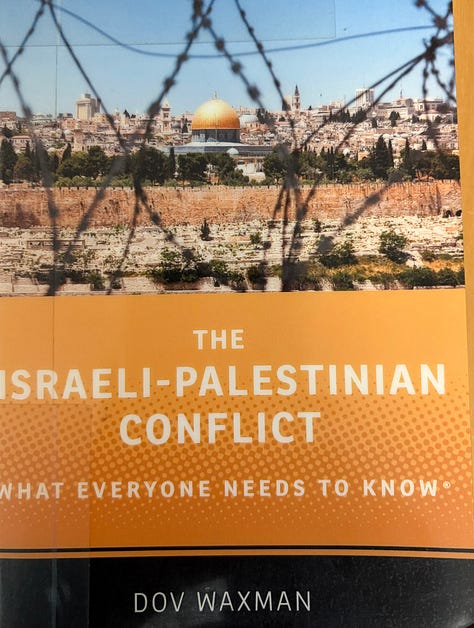
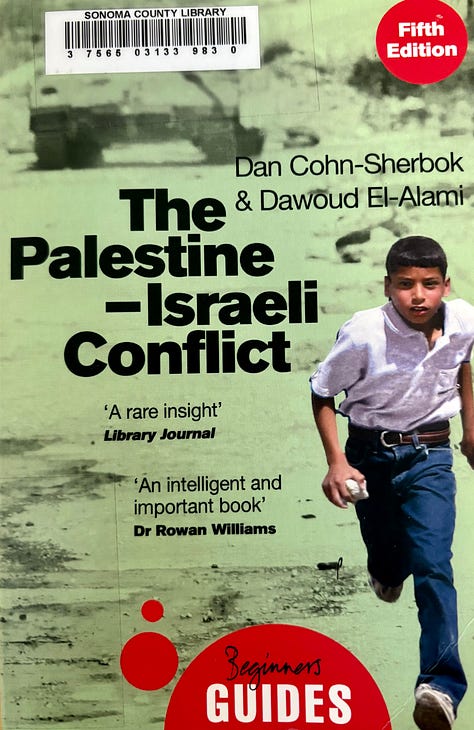

The dense yet clearly written text, published in 2019, explains (as stated in the preface) “the major events and the impacts they have had on the conflict.” But it goes beyond a descriptive history:
“Since Israelis and Palestinians often view these events very differently, the book also highlights these contrasting popular narratives because they not only play a key role in shaping their collective beliefs about the conflict but also fuel the conflict itself.” – The Israeli-Palestinian Conflict: What Everyone Needs to Know by Dov Waxman
Likewise, the Beginner’s Guide (revised and updated in 2022) splits the book between “A Jewish perspective” (by Dan Cohn-Sherbok) and “A Palestinian perspective” (by Dawoud El-Alami), both useful and problematic in its binary divide, as there isn’t just one perspective from each “side” (granted, sections are titled as a not the)—i.e. one Jewish perspective can’t speak for an entire Diaspora; even within Israel (another deeply divided nation), many people were demonstrating on the streets against Netanyahu’s right-wing policies and calling for an election, just as Palestinians in Gaza were protesting the militant Islamist rule of Hamas.
Ghosts of a Holy War (2024) is the only one current enough to address the horrors of October 7 and the literal and political fallout from Netanyahu’s ensuing war. Written by Yardena Schwartz, an award-winning journalist who reported from Israel for a decade, it tells the story of the early Jews of Hebron (long before the establishment of a state or the military occupation or settlement movement in the West Bank) and 1929 massacre, which the author attributes to ending “centuries of peaceful coexistence,” whose aftershocks she argues led to today’s ongoing conflict.
I’m considering multiple perspectives while contemplating what it means to Jewish and American (and humanitarian) standing for pro-peace in the Middle East. For now, I’ll keep reading.
room to write
The Sitting Room library, where my writing workshops began five years ago, just celebrated its 44th birthday (on the same day as Kristen’s 55th). I missed the party, but I spent time there a few days later with two writing pals. We three (a poet, a novelist, an essayist) went with intention to meet monthly as a queer affinity group.
“We should call ourselves The L-Word,” I said, half-jokingly. The name stuck.
We each introduced our work and shared a status update (including our emotional relationship to creative writing and particular themes or challenging subject matter). We wrote in the same space together for half an hour then read a short excerpt from something we were currently working on. What an amazing cohort!
I stayed for another couple of hours, writing in the quiet. That afternoon the novelist introduced a new component and completed a chapter, while the poet developed her erasure abecedarian of DOGE’s banned words list, reinvigorated.
Join me in person for Creative Writing on Sunday, August 17, from10am–12pm:
During this creative workshop (or playshop) we will use books, art, and ephemera from The Sitting Room to prompt our writing. I will invite us to play with forms as we explore the library and write expressively. Participants will have time to share writing aloud (always optional). Rather than critique just-written work, the group’s attentive listening and affirmative feedback will guide our practice. Please RSVP to JoAnn Borri at joannborri@gmail.com. Limit 10. https://sittingroomlibrary.org/events
office hours open
This month I led my first writing consultation—aka Office Hours (a business service at Pencil & Pen)—with someone who has taken a few of my writing workshop series.
I was a bit nervous: Would I deliver or might the person leave disappointed? It was a pure delight to discuss her creative ideas for an hour over Zoom. Likewise, she said she loved our conversation and was honored to be my first official (i.e. paying) client:
“It was just what I needed! One of the challenges with this writing/creative life is the isolation in it all—in one's mind as well as physical space. I certainly feel less alone in my desire to write and make images about the things that move me. Your generous listening and follow-up has reinvigorated my creative process.”
Book a 1-Hour Office Hours consultation: $85
It’s a great way to strengthen your writing practice and stay motivated!
(Note: I’ll be away from the “office” until mid-August.)
art of revision
In March I took a Nonfiction Re-Vision Intensive: an advanced course from Off Assignment, taught by Margo Steines, author of the memoir Brutalities, A Love Story.
Limited to 14, the course required an essay draft submission (up to 6,000 words) plus reading several iterations of the instructor’s revision process on her own work, including how she incorporated editorial suggestions into her book. We also met 1:1 with Margo to co-create an editing/revision plan for our projects, which was tremendously useful as she provided me a road map (hello, reverse outline).
Since then I’ve been slowly revising “Ties That Bind,” which The Rumpus rejected more than a year ago but hoped I’d submit a revision in the future:
“… while we ultimately felt it wasn’t right for us, I wanted you to know that we love your voice… Our editors felt that it didn't yet stand on its own fully, so could the narrator do a bit more reflection and provide some further contextualization to situate the narrator today in relation to the scenes?” – Robbie Maakestad
First I cracked open the spine of the story, dismantling its scaffolding to make space for more characterization (of myself and my family) and add narrative reflection from a retrospective storyteller with insight I didn’t have then. I even unearthed old journals (and my father’s notes as well as other family archival materials), which fleshed out some details of scenes and dialogue snippets I’d long forgotten.
I finally completed my revision of the 4,550-word essay, which Kristen had minor feedback for (“you landed the ending!”) just in time for The Rumpus’ summer submission window to open. Off it goes again…
works in progress
To further support progress on my memoir revision, I applied (and was accepted) to Pam Houston’s Writing By Writers Manuscript Boot Camp, designed for writers with a full, book-length manuscript. Held at Sundance Mountain Resort in Utah during an extended weekend in October, this “pre-publication boot camp” includes craft panels, readings, and daily manuscript workshops limited to 5 participants plus individual meetings with a manuscript review of up to 80,000 words.
I received my first-choice workshop with Gina Frangello whose memoir Blow Your House Down: A Story of Family, Feminism, and Treason I’d used as a comparative title in a book proposal, which I quoted in my synopsis (with required opening chapter):
“Inspired by the book’s nonlinear structure, I experiment with form to express similar themes of transgression and transformative power…”
With a mid-September deadline to send the full (revised as much as possible) manuscript, I’m under pressure (I despise yet need the stress of it to produce!).
In addition to the aforementioned piece, I recently revised “College Access Guarantee,” a book essay about shepherding my eldest nephew through the college search and application process (while his father was vying for a year of “missionizing” as he’d done after dropping out of UC Berkeley). I sent it to Solstice Literary Magazine’s annual contest and the 60th New Millennium Writing Awards.

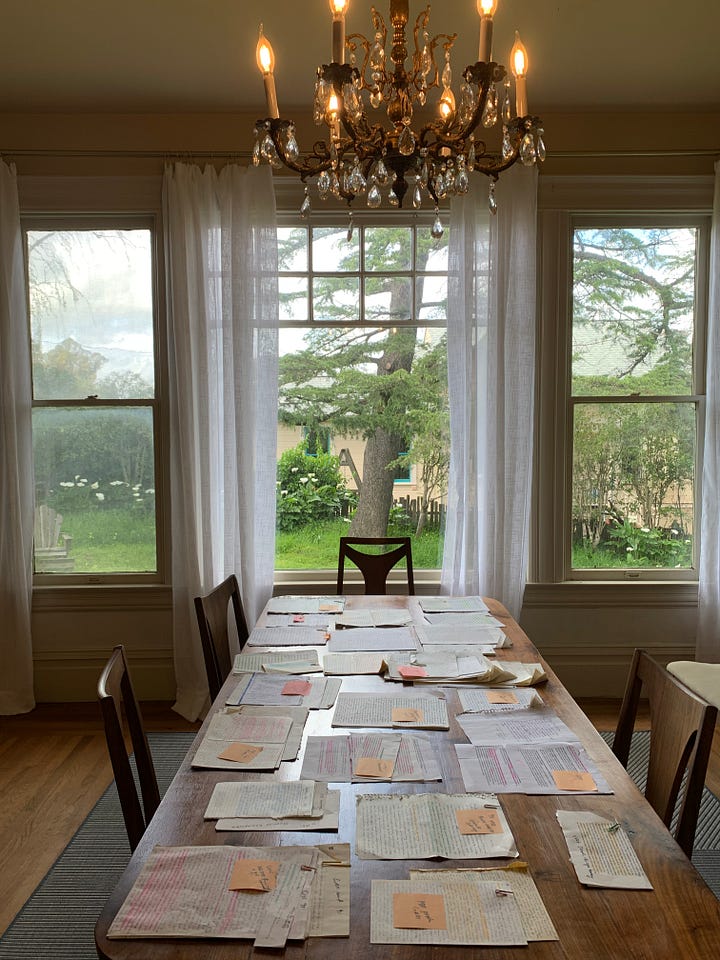
I also revised a hermit crab essay, “Reading Comprehension,” submitted to a Bellevue Literary Review contest as well as to CRAFT, which had welcomed me to “bypass the generally required three-month waiting period and submit creative nonfiction again soon” after passing on “Dissolution,” an essay that “stood out for us.”
I sent the latter piece (not selected as a finalist in the Ninth Letter Literary Awards) to the Best Emerging Writers contest at The Masters Review. And, after my prose poem “Unanswerable” was declined by the Tahoma Literary Review, I slightly revised and rerouted it to Speculative Nonfiction (themed issue: Promise); Midway Journal’s Flash Prose and Poetry Contest (where “Roadside Markers” was a finalist); and Michigan Quarterly Review’s MQR Mixtape on the theme of Haunting.
autumn writing workshops
Two weeks ago we completed another wonderful 8-week workshop series. I always end with a closing circle for people to share insights about their own writing or about our workshop community. Here are a few appreciations shared:
the quality of listening
workshop structure as a platform for generative writing
gentle, attentive, and spacious group members
workshop leader’s sensitivity and caring
As stated on my website: Sometimes you just need space to write & someone to listen. Or, as one participant poetically said: “Writing here helps me to feel a bit of found.”
It’s time to retrieve & revitalize the artist within! Register for Fall writing workshops (staring in 10 weeks). Sign up at Pencil & Pen:
Plus: I’m offering a 6-week series for Newly Trained AWA Workshop Leaders
If you’re an AWA-certified facilitator who hasn’t yet fledged, join other newly hatched workshop leaders in the same “nest.” You’ll gain more experience using the Amherst Writers method and develop more confidence to “fly” on your own.
Thursdays: Sept. 18 – Oct. 23, 2025: 2pm–4pm Pacific on Zoom
in mourning & celebration
June 14, the same day we thousands took to the streets, also marked the 8th month since my young nephew’s death by suicide. While I’ve written about Chris in each newsletter thereafter, one of my cousins who lost her brother the same way nine years ago reached out to share her own journey with healing this heartbreak like no other.
It’s comforting to know the initial trauma and raw grief dissipates over time (it already has, thanks to therapy, writing, crying release, and the love of friends/family and Kristen), knowing it will “always be a huge loss and the grief modulates but never goes away.”
This week I boxed this altar since our homeowners will be staying in our rental (by special arrangement) during the month of July. Tomorrow we fly to the east coast to visit a dear aunt and uncle, then spend a few days celebrating my eldest nephew’s wedding to a wonderful woman who stood by his side through recovery from a severe concussion and his brother’s tragic passing. It’s a bittersweet trip full of joyful anticipation tinged with sadness for our family in the wake of Christopher’s absence.
Then we’re off to Prince Edward Island and Newfoundland for a hiking vacation (plus 5 nights in Montreal). I’ll be OOO until August, so there won’t be another newsletter until then. Take care, all.

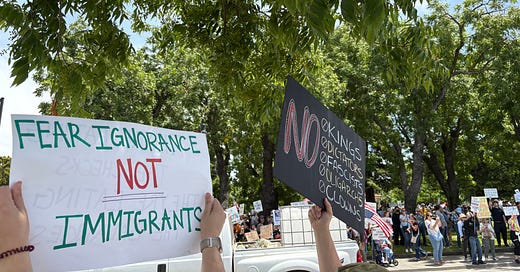



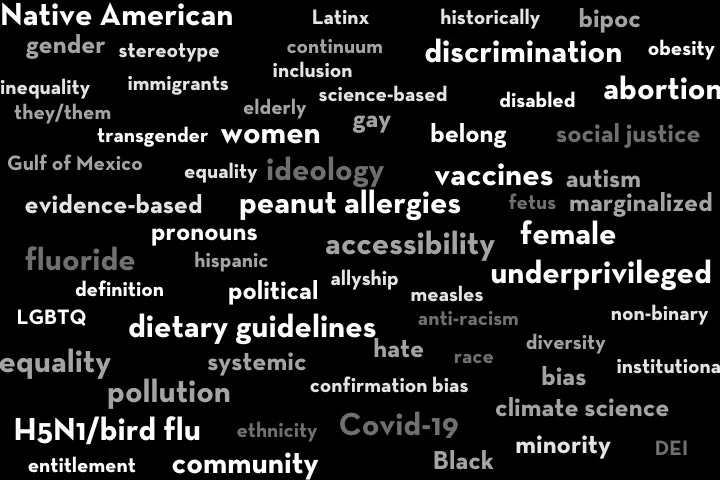

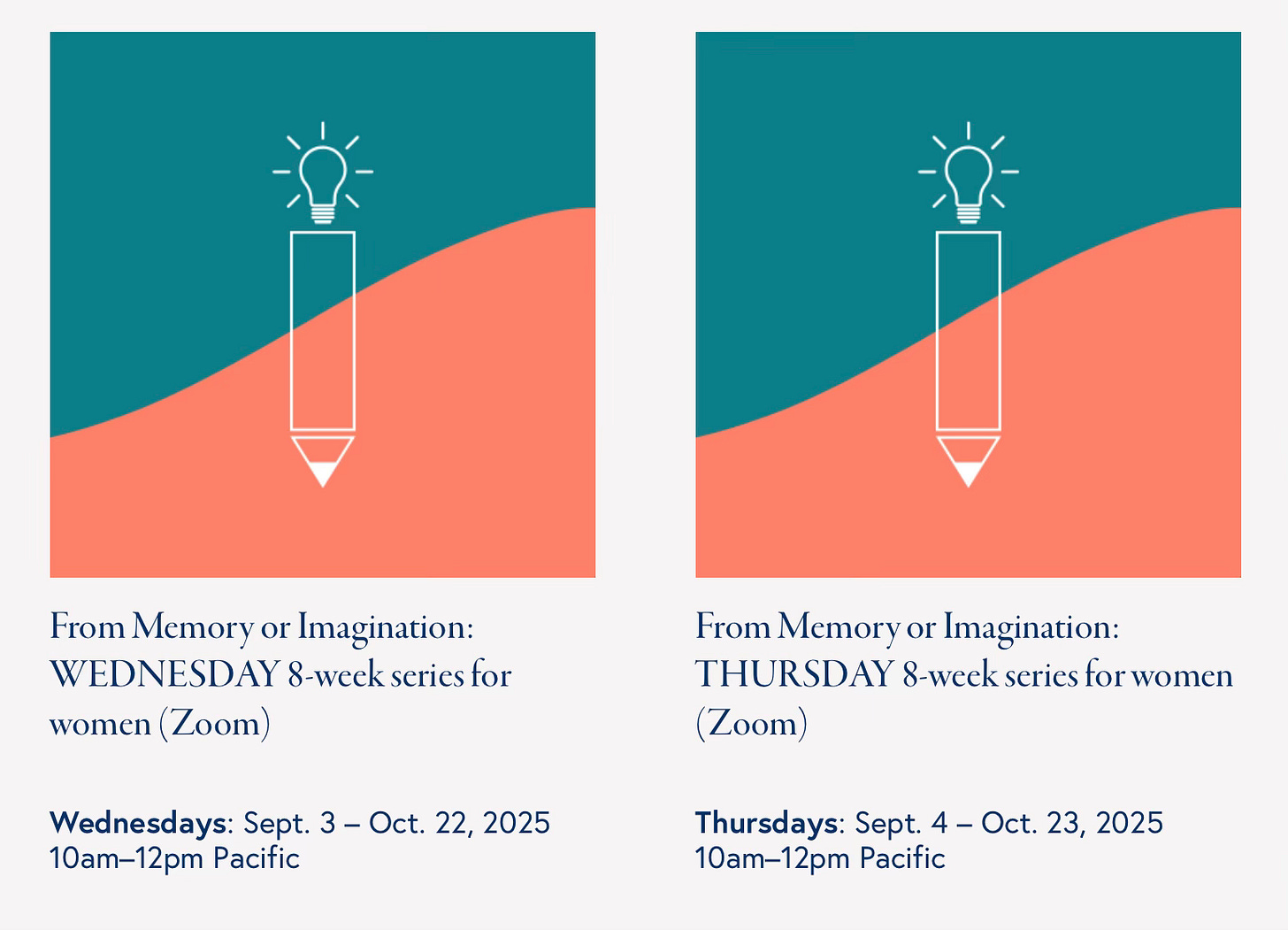
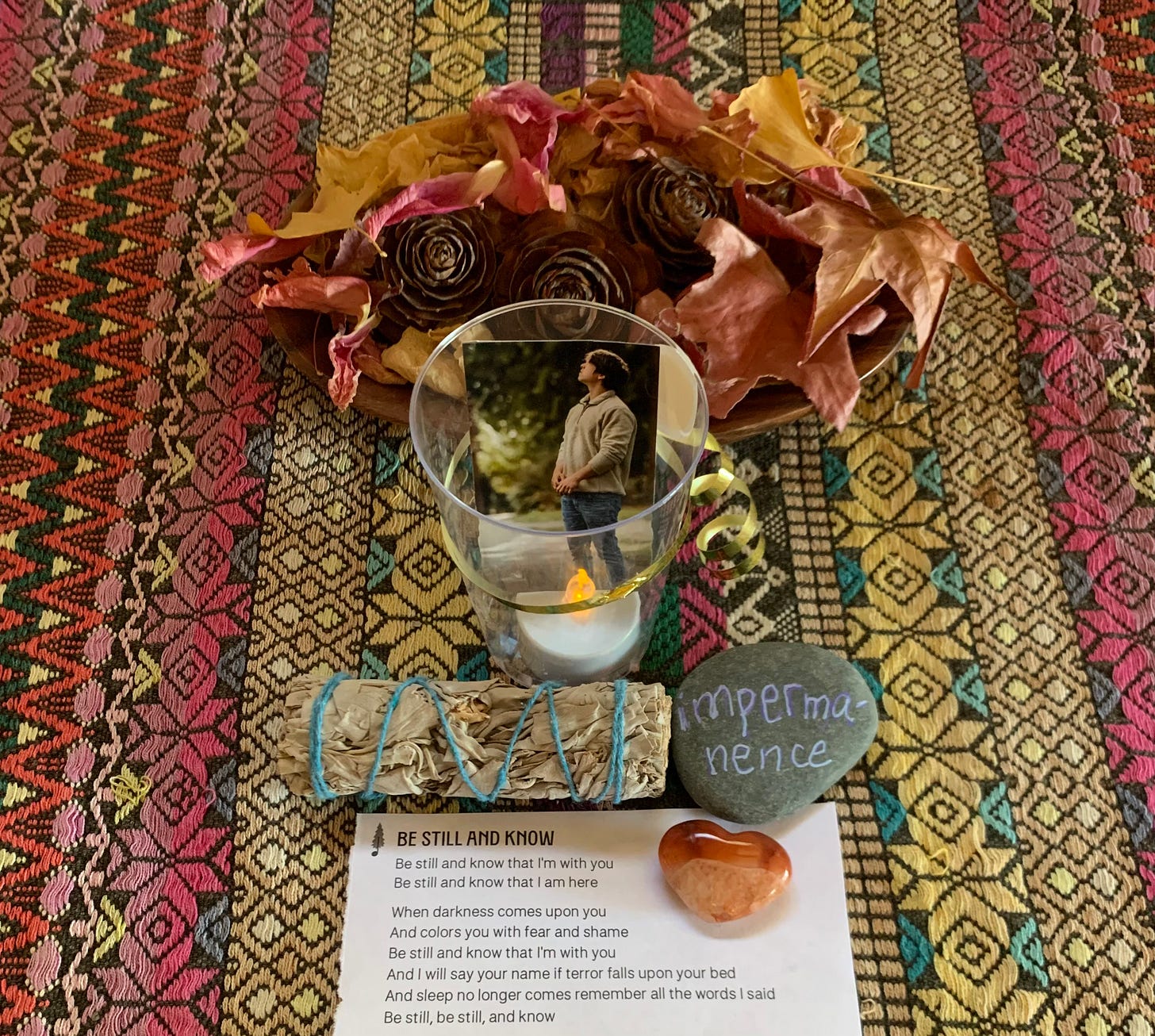
Hi Nicole. Lovely, as usual. You might want to try Edward Said's book, Orientalism. I read it way back in the 90's & it was a stunning eye opener for me. Here's a blurb on it:
Edward Said's "Orientalism" explores how the West has historically portrayed the East as exotic, backward, and inferior. Said argues that this representation is not just a cultural misunderstanding but a discourse that reinforces Western dominance over Eastern societies. The book is structured into three main parts, examining the academic, cultural, and political implications of Orientalism, and how it shapes Western perceptions of the Middle East and Asia. Overall, "Orientalism" critiques the stereotypes and assumptions that have influenced Western thought and policy regarding the East." (Not sure the reference cite of this blurb)
Safe travels, dear friend.